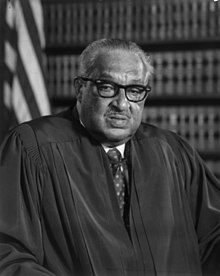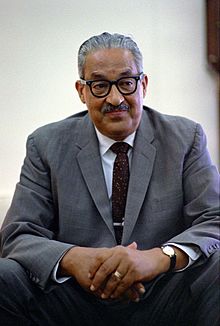Thurgood Marshall
Appearance

Thurgood Marshall (July 2, 1908 - January 24, 1993) was an American lawyer and civil rights activist who served as Associate Justice of the Supreme Court of the United States from October 1967 until October 1991. Marshall was the Court's first African-American justice. Prior to his judicial service, he successfully argued several cases before the Supreme Court, including Brown v. Board of Education.
Quotes
[edit]

- The central problem with Chicago's ordinance is that it describes permissible picketing in terms of its subject matter. Peaceful picketing on the subject of a school's labor-management dispute is permitted, but all other peaceful picketing is prohibited. The operative distinction is the message on a picket sign. But, above all else, the First Amendment means that government has no power to restrict expression because of its message, its ideas, its subject matter, or its content. [Citations.] To permit the continued building of our politics and culture, and to assure self-fulfillment for each individual, our people are guaranteed the right to express any thought, free from government censorship. The essence of this forbidden censorship is content control. Any restriction on expressive activity because of its content would completely undercut the '"profound national commitment to the principle that debate on public issues should be uninhibited, robust, and wide-open." New York Times Co. v. Sullivan, supra, at 376 U. S. 270.
- Police Department of Chicago v. Mosley, 408 U.S. 92 (1972).
- At a time in our history when the streets of the Nation's cities inspire fear and despair, rather than pride and hope, it is difficult to maintain objectivity and concern for our fellow citizens. But, the measure of a country's greatness is its ability to retain compassion in time of crisis. No nation in the recorded history of man has a greater tradition of revering justice and fair treatment for all its citizens in times of turmoil, confusion, and tension than ours. This is a country which stands tallest in troubled times, a country that clings to fundamental principles, cherishes its constitutional heritage, and rejects simple solutions that compromise the values that lie at the roots of our democratic system.
- Furman v. Georgia, 408 U.S. 238, Concurring opinion (January 17, 1972).
- When the prison gates slam behind an inmate, he does not lose his human quality; his mind does not become closed to ideas; his intellect does not cease to feed on a free and open interchange of opinions; his yearning for self-respect does not end; nor is his quest for self-realization concluded. If anything, the needs for identity and self-respect are more compelling in the dehumanizing prison environment.
- Procunier v. Martinez, 416 U.S. 396 (1974) (Concurring opinion).
- The experience of Negroes in America has been different in kind, not just in degree, from that of other ethnic groups. It is not merely the history of slavery alone, but also that a whole people were marked as inferior by the law. And that mark has endured.
- Regents of University of California v. Bakke, 438 U.S. 265, 400-401 (1978) (Marshall, J., concurring in part and dissenting in part).
- History teaches that grave threats to liberty often come in times of urgency, when constitutional rights seem too extravagant to endure. The World War II relocation-camp cases, Hirabayashi v. United States, 320 U.S. 81 (1943); Korematsu v. United States, 323 U.S. 214 (1944), and the Red scare and McCarthy-era internal subversion cases, Schenck v. United States, 249 U.S. 47 (1919); Dennis v. United States, 341 U.S. 494 (1951), are only the most extreme reminders that when we allow fundamental freedoms to be sacrificed in the name of real or perceived exigency, we invariably come to regret it.
- Skinner v. Railway Labor Executives Association, 489 U.S. 602 (1989), Dissenting opinion (March 21, 1989), at 635.
- I do not believe that the meaning of the Constitution was forever “fixed” at the Philadelphia Convention. Nor do I find the wisdom, foresight, and sense of justice exhibited by the Framers particularly profound. To the contrary, the government they devised was defective from the start, requiring several amendments, a civil war, and momentous social transformation to attain the system of constitutional government, and its respect for the individual freedoms and human rights, we hold as fundamental today. When contemporary Americans cite “The Constitution,” they invoke a concept that is vastly different from what the Framers barely began to construct two centuries ago.
- ThurgoodMarshall.com, Speeches. Constitutional Speech (May 6, 1987).
- America must get to work. In the chilled climate in which we live, we must go against the prevailing winds. We must dissent from the indifference. We must dissent from the apathy. We must dissent from the fear, the hatred, and the mistrust. We must dissent from a nation that buried its head in the sand waiting in vain for the needs of its poor, its elderly, and its sick to disappear and just blow away. We must dissent from a government that has left its young without jobs, education, or hope. We must dissent from the poverty of vision and timeless absence of moral leadership. We must dissent, because America can do better, because America has no choice but to do better.
- Speech delivered on September 6, 1990, before the Annual Judicial Conference of the Second Circuit, quoted in Supreme Justice Speeches and Writings Thurgood Marshall. Edited by J. Clay Smith, Jr. (2002).
- The legal system can force open doors, and sometimes-even knock down walls, but it cannot build bridges. That job belongs to you and me. The country can't do it. Afro and White, rich and poor, educated and illiterate, our fates are bound together. We can run from each other, but we cannot escape each other. We will only attain freedom if we learn to appreciate what is different, and muster the courage to discover what is fundamentally the same. America's diversity offers so much richness and opportunity. Take a chance, won't you? Knock down the fences, which divide. Tear apart the walls that imprison you. Reach out. Freedom lies just on the other side. We shall have liberty for all.
- Speech delivered on September 6, 1990, before the Annual Judicial Conference of the Second Circuit, quoted in Supreme Justice Speeches and Writings Thurgood Marshall. Edited by J. Clay Smith, Jr. (2002).
- [T]here's no difference between a white snake and a black snake. They'll both bite.
- Lewis, Neil A. (29 June 1991), "Marshall Urges Bush to Pick 'the Best'", New York Times, retrieved on 2017-04-08
- MIsquote: White snake, black snake: They both bite.
Quotes about Thurgood Marshall
[edit]- One fact lay embedded in the center of the Clarence Thomas controversy: We have lost a great American jurist, Thurgood Marshall. No one can replace him. The very thought of replacing him insults the brilliance of his career and the exceptional humanity of his intelligence as he reflected upon our most extreme and consequential public debates. And yet someone new had to be appointed to take his seat. The President made his move. He nominated a man as different from Marshall as George Bush differs from Mahatma Gandhi.
- June Jordan "Thomas was not the Point" in Affirmative Acts (1998)
- The case [Jones v. North Carolina Prisoners' Union] ended up in front of the Supreme Court, which ultimately reversed the decision and set a devastating precedent that, even under the First Amendment, prisoners have no legal right to join a union. To his credit, Justice Thurgood Marshall dissented, writing, "The Court, in apparent fear of a prison reform organization that has the temerity to call itself a 'union,' takes a giant step backwards toward that discredited conception of prisoners' rights and the role of the courts." It was cold comfort. Marshall's doomsaying analysis of the case's potential fallout was correct.
- Kim Kelly (journalist) Fight Like Hell: The Untold History of American Labor (2022)
- Justices William Brennan and Thurgood Marshall were the last of the Court's liberals.
- Howard Zinn, A People’s History of the United States


